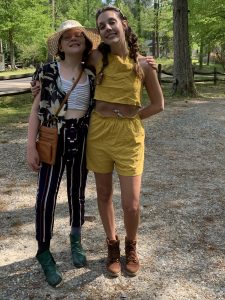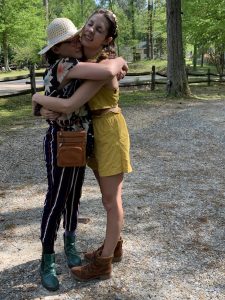Let’s Adapt the Word ‘Adaptive’
“I need to change my language.”
I said this to my rehearsal director the other day after realizing I said the word “adaptive” again.
“I hate the word adaptive,” I kept saying with increasing intensity. “It denotes that something is more and something is less.”
In dance, we use the word adaptive to establish a hierarchy of sorts. One version is the “real” version, the “true” version, while the other is reduced. Because I co-direct a dance company called ComeBacks for those with chronic illness and mobility disorders, I am tempted to use this word all the time when offering two different options for how to move.
“I thought of a new word!” I finally exclaimed, effervescing to my ComeBacks dancers during digital rehearsal.“And I don’t think it boasts inclusion on the backs of those that made it.”
Inclusion is trendy these days. It should be. But the way we talk about it matters. Do we use it as a selling point, advertising the disabled community without actually listening to them? Do we make adaptation a way of life or just an “offering” here and there for social bonus points to our brand?
I want to make things that feel natural for everyone (or as many people and bodies and minds as possible), but I want to adapt how we talk about adapting, too.
“Dynamic,” I said. “If offering two different options in dance rehearsal or class, we should call them dynamics.”
“Which dynamic will you choose?” we might say. “How will you play with this dynamic?”
Dynamics are an option, yes, but they’re intrinsically equal as well. Dynamics are something we choose to play with ourselves, putting the power in our hands again.
We are not being offered an amicably abridged choice compared to the master model, the standard we aren’t meeting. Instead, we are picking whatever dynamic serves us that day, and adding dynamics to our movement within.
If there is one thing I’ve learned in this life (and also the world of dance, which is a metaphor for life), it’s to stay as unobtrusive as possible. If I asked someone to make an exception for me — my health, my Deafness, my needs — I don’t dare ask too much or raise a fuss. Be quiet. Be agreeable. Get invited. Apologize, a lot.
Instead of a “modified example” or a smaller choice, what if I finally decided to take up space?
There is a simple sequence of events that happen after a disabled or sick person explains their needs in order to be included: We get excluded. “Adding captions takes too much work,” we say, or, “That interpreter is too expensive. Can you provide your own?”
But offering different dynamics for the same experience is not as hard as we think. Clear masks so someone can read lips. Learning basic signs so someone can communicate. Adding a ramp. Considering bathroom placement before buying the building. If we all just did these things before we act, the world would be a place that accounts for everyone.
The fact of the matter is: You’re missing out. You’re missing out on people who can make your world better. Talented minds. Artistic viewpoints. Humor, kindness, creativity. Sick and disabled people are all of these things (sometimes we’re tools, too, to be fair), but you’re missing out by not paving a path everyone can land on.
So, here I sit. Worried about asking for accommodation. Scared to say “accessibility” because I don’t want to consider myself less. I’m sick of it. Sick, but sometimes better for it.
You need me, world. You really do. You need all of us. Yet, you exclude us because of the extra work it takes. You want us to be gentle and complacent, make things as easy on you as possible. Well, I’m tired of being the modified version of someone else’s life.
I’m worth adapting (always) and not benefiting from it in the process. I’m worth including and not thinking interpreters and captions are too much time. I’m worth your time, just as you believe yourself to be worth mine.
I am not the adapted version of your “better,” I just am. Exactly as I should be.
And that’s pretty damn dynamic.
***
Note: Cystic Fibrosis News Today is strictly a news and information website about the disease. It does not provide medical advice, diagnosis, or treatment. This content is not intended to be a substitute for professional medical advice, diagnosis, or treatment. Always seek the advice of your physician or other qualified health provider with any questions you may have regarding a medical condition. Never disregard professional medical advice or delay in seeking it because of something you have read on this website. The opinions expressed in this column are not those of Cystic Fibrosis News Today, or its parent company, Bionews, and are intended to spark discussion about issues pertaining to cystic fibrosis.










Paul & Debbie
You totally nailed it! All is one, and it's one dynamic. We should stop separating, it's untrue. Acting as one will create the real reality.
Young Lee
Love this. Very thought-provoking.